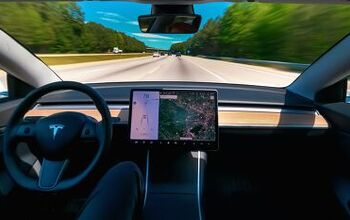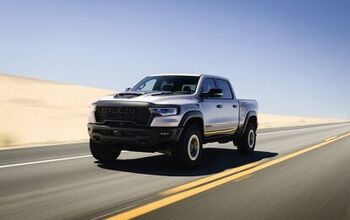By The Numbers: What is So Rare as a Truck Sold in June?
Everyone in the car biz knows that June was a catastrophic month for the U.S. new car market. Total sales dropped by 18.3 percent. The big change this time 'round: it wasn't just light trucks that took it on the chin. Car sales received some body blows, as well. If you're an auto industry exec [still] living in denial, it's best to stop here. If not, read 'em and weep. [NB: As per TTAC policy, sales numbers not adjusted for "sales days."]
Family Cars
As SUV refugees seek car-shaped shelter, there were some big winners in June. Sales of the Chevy Malibu* rose by an astounding 73.4 percent over last June, up 31.2 percent year to date (YTD). Honda's Accord chalked-up a 37.3 percent gain for the month, up 12.9 percent YTD. Ford's Fusion finished the month 18.4 percent ahead of last June, up 11.7 percent YTD. Meanwhile… Chrysler's once-proud full-size sedan continues to tank; 300 sales dropped 61.6 percent from last June, down 36.5 percent YTD. And surprise: the Toyota Camry took a hard hit, dipping 10.8 percent below last June, posting a 0.3 percent loss for the year.
Compacts
The Chevy Cobalt was another winner for GM, up 21.6 percent for the month and 18.5 percent YTD. The Dodge Caliber was another loser for Chrysler, down 43.6 percent for the month and down 0.5 percent YTD. Worryingly, Ford's Focus dropped 5.5 percent in June. But it's still 27.6 percent ahead of last year. The Toyota Corolla** continues strong sales, up 15.6 percent on month. Yet it still trails last year by 3.8 percent. Honda's Civic* finished the month 9.5 percent ahead of last June and 17.9 percent ahead of last year. The Sentra didn't do as well for Nissan. It was down nine percent on month, struggling to finish the first half of the year up 3.5 percent.
Subcompacts
Honda's fuel-efficient Fit was a big winner. Sales leaped 78.2 percent ahead of last June, finishing the semester up 67.4 percent. Nissan's Versa finished the month up 17.4 percent for June and 20.7 percent ahead YTD. GM's entry in this genre ran out gas. Sales of their Korean econobox Aveo were down 19.7 percent; down 1.7 percent YTD. Toyota's Yaris also lost ground, ending June down 7.5 percent; though staying 39 percent ahead YTD.
Trucks
Brace yourself. Chevy's Silverado* sales tumbled by 23.7 percent on the month, 25.6 percent YTD. Dodge's Ram fell 48.1 percent in June, down 30.4 percent for the first six months. Ford's F-Series sales dropped by 40.5 percent from June '07, ending the first two quarters down 22.7 percent. The Toyota Tundra , which had posted sales gains for the first quarter, finished the second quarter down 52.9 percent from last June; down 7.6 percent YTD. The Texas-built Tundra may soon drop below 2006's sales line.
Truck-Based SUVs
Chevy's Tahoe* showed a surprising gain from May (fleet sales?), adding about 2.5k units to the tally. finishing the month "just" 9.8 percent below last June. However, Tahoe sales are still down 26.6 percent YTD. The Dodge Durango continued its descent into oblivion, dropping a massive 67.3 percent in June, down 48.4 percent on the year. The Ford Explorer showed an equally abysmal June, losing 52 percent from last June and 33.2 percent from last year. Toyota's Sequoia continued its death-defying growth, surging by 25.1 percent in June, showing a 28.8 percent gain YTD.
Crossovers
The crossover bubble's burst. Thanks to a slow start last year, GMC's Acadia is up 8.5 percent on the year. But June sales fell off a cliff, down 40.1 percent from last June. Ford's Edge also dropped in June, this time by 19.9 percent. Robust sales earlier this year puts it 16.9 percent ahead of last year– for now. Toyota's woes continued, with Highlander* sales down 38.9 percent in June and 5.2 percent compared to 2007. The new Honda Pilot wasn't exactly pulling them in either; sales were down 29.8 percent for the month and 16.7 percent YTD.
Prius
Toyota's Prius dropped for the second month in a row. Due to short supplies and high demand worldwide, stateside sales are down 33.7 percent from last June. Sales drops in May and June pulled its year-to-date sales to 3.2 percent below last year. Toyota plans to produce 450k Priora in 2008; they've already sold 91.4k of them in North America alone so far this year. So look for their sales numbers to remain relatively low, in spite of growing demand.
By Manufacturer
GM's Hail Mary end-of-month 0% financing deal helped stave off a total rout. The General managed to finish June a "mere" 18.2 percent below last June's pace, down 16.3 percent for the year. Toyota's performance was June's shocker. ToMoCo ended the month 21.4 percent below June '07 (well below GM's dismal performance), dropping 6.8 percent on the year. Meanwhile, Chrysler sales fell by a staggering 35.9 percent for the month. ChryCo's trailing last year's sales by 22 percent. Ford was down 29.5 percent for June, 14.5 percent YTD. Honda managed to finish the month relatively unscathed, showing a 1.1 percent increase, with a 4.1 percent increase year to date.
Looking Ahead
July's misery may well eclipse June's. GM ran their 0% financing deal for the first week of the month, so they've up you-know-where without a you-know-what (small car?). Ford, Chrysler and Toyota are all offering incentives of varying sizes, particularly on the trucks and SUVs nobody wants. At what point will the deals become sweet enough to overcome the fuel bill? The sales numbers show we aren't there yet. As fuel prices climb, or even just hold steady, as the Fed declares that the economic gloom will extend well into '09, it's clear we're still a long way from the bottom of this combination of a violent contraction and a wholesale shift in product preference.
*Includes hybrids
More by Frank Williams
Latest Car Reviews
Read moreLatest Product Reviews
Read moreRecent Comments
- W Conrad I'm not afraid of them, but they aren't needed for everyone or everywhere. Long haul and highway driving sure, but in the city, nope.
- Jalop1991 In a manner similar to PHEV being the correct answer, I declare RPVs to be the correct answer here.We're doing it with certain aircraft; why not with cars on the ground, using hardware and tools like Telsa's "FSD" or GM's "SuperCruise" as the base?Take the local Uber driver out of the car, and put him in a professional centralized environment from where he drives me around. The system and the individual car can have awareness as well as gates, but he's responsible for the driving.Put the tech into my car, and let me buy it as needed. I need someone else to drive me home; hit the button and voila, I've hired a driver for the moment. I don't want to drive 11 hours to my vacation spot; hire the remote pilot for that. When I get there, I have my car and he's still at his normal location, piloting cars for other people.The system would allow for driver rest period, like what's required for truckers, so I might end up with multiple people driving me to the coast. I don't care. And they don't have to be physically with me, therefore they can be way cheaper.Charge taxi-type per-mile rates. For long drives, offer per-trip rates. Offer subscriptions, including miles/hours. Whatever.(And for grins, dress the remote pilots all as Johnnie.)Start this out with big rigs. Take the trucker away from the long haul driving, and let him be there for emergencies and the short haul parts of the trip.And in a manner similar to PHEVs being discredited, I fully expect to be razzed for this brilliant idea (not unlike how Alan Kay wasn't recognized until many many years later for his Dynabook vision).
- B-BodyBuick84 Not afraid of AV's as I highly doubt they will ever be %100 viable for our roads. Stop-and-go downtown city or rush hour highway traffic? I can see that, but otherwise there's simply too many variables. Bad weather conditions, faded road lines or markings, reflective surfaces with glare, etc. There's also the issue of cultural norms. About a decade ago there was actually an online test called 'The Morality Machine' one could do online where you were in control of an AV and choose what action to take when a crash was inevitable. I think something like 2.5 million people across the world participated? For example, do you hit and most likely kill the elderly couple strolling across the crosswalk or crash the vehicle into a cement barrier and almost certainly cause the death of the vehicle occupants? What if it's a parent and child? In N. America 98% of people choose to hit the elderly couple and save themselves while in Asia, the exact opposite happened where 98% choose to hit the parent and child. Why? Cultural differences. Asia puts a lot of emphasis on respecting their elderly while N. America has a culture of 'save/ protect the children'. Are these AV's going to respect that culture? Is a VW Jetta or Buick Envision AV going to have different programming depending on whether it's sold in Canada or Taiwan? how's that going to effect legislation and legal battles when a crash inevitibly does happen? These are the true barriers to mass AV adoption, and in the 10 years since that test came out, there has been zero answers or progress on this matter. So no, I'm not afraid of AV's simply because with the exception of a few specific situations, most avenues are going to prove to be a dead-end for automakers.
- Mike Bradley Autonomous cars were developed in Silicon Valley. For new products there, the standard business plan is to put a barely-functioning product on the market right away and wait for the early-adopter customers to find the flaws. That's exactly what's happened. Detroit's plan is pretty much the opposite, but Detroit isn't developing this product. That's why dealers, for instance, haven't been trained in the cars.
- Dartman https://apnews.com/article/artificial-intelligence-fighter-jets-air-force-6a1100c96a73ca9b7f41cbd6a2753fdaAutonomous/Ai is here now. The question is implementation and acceptance.


































Comments
Join the conversation